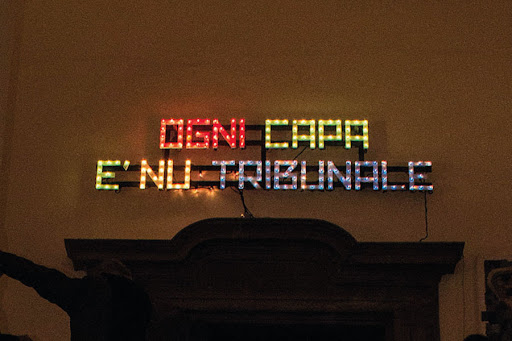It is a neapolitan way of saying which means: "every head is a court". This article is the first of a set of posts about an hopeful fruitful interaction with a group of neapolitan activists interested in experimenting with bonfire.
As we’re approaching a new phase in which bonfire is not anymore a chimera among few devs, but it’s starting to come together as a nice tool, some of us are anxious to make raids in the analogic world and spread the big news: bonfire exists!
Today I visited Naples for the first time after the beginning of the pandemic. I met some friends and discussed about how bonfire could be useful to their communities and practices and how communities and practices can be useful to bonfire.
There’s many reasons I always thought at Naples as the first place to discuss a possible bonfire adoption, all of them rotate around a single yet powerful concept: contamination.
In my experience as a developer, contamination is one of the most feared and therefore dismissed aspect when building a software. Speaking of bonfire, being able to respond and adapt to contamination is its core value proposition. Needless to say, Naples is the shangri-la of contaminations and I am lucky enough to have friends who navigate this ocean of contaminations and contradictions in a superb way.
When I cite Naples i'm referring to participants of the urban commons network. Activists that most of the time cross different places, communities and initiatives. In front of the oldest restaurant of Via dei Decumani, we started wondering about the possibility of lighting a few bonfires in Naples.
Below a list of not exhaustive topics we brainstormed during the day:
- There is a general tension to restore practices after the pandemic
- It's hard for a community already used to communicate/work with a specific software (even if closed source or whatever) to shift to a different one. It's a lot about changing habits, and picking new habits requires trust, energy, time, mental effort...
- For some users, dealing with huge and complex apps is an overwhelming experience - sometime they just need a little app that solves a functional/pressing issue, leaving everything else aside.
- Sometime community members have difficulties using even the most trivial/hegemonic/widespread apps like whatsapp, facebook or google drive - or they feel repulsion for the digital world at scale, how could it be possible to not exclude them from the community flow of discussions / coordinations / decisions that takes place online ?
- Different participants have different priorities and needs about how to be part and be involved with each community and such differences are reflected in the tools they are up to adopt and how they want to use them.
- Nonetheless it sounds to be a good historic moment for the neapolitan network to bring back the discussion about adopting a platform for the urban commons network.
- Speaking of using bonfire for coordinating work and productions - there's an on-going, crucial even if sometime stale conversation that gravitate around income, activism, distribution of value and commons goods.
- Is it possible to envision and approach a software as a common good itself rather than a mere service/product?
- What would it mean for a software to be a common good?
- In which ways a community can take care of a software?
- What would imply for a software to be a common good from the governance perspective?
- How bonfire can foster co-design and community-driven development?
Suggestions for next extensions #
Current bonfire extensions: Social, Kanban and Offers/Needs - even if still under development - caught the eye because in a way or another they answered current needs of different communities.
Nonetheless during our conversations two new extensions were cited several times as worth to note.
Federated calendar #
It's hard to coordinate initiatives among different communities and organize events that do not cross existing ones. At today, this requires lot of chats and schedule changes at last moment. Having a federated calendar would allow activists to have a general view across everything that's happening within the network. This would greatly enhance the activities planning and coordination.
The calendar should span across different levels: it would allow users to view all the activities planned in the wider network and zoom in/out to specific area/communities, as well as filter for specific topics or date range. We didn't investigate further how such federated calendar should work, but it's all good food for thoughts.
Federated governance #
How to take decisions and how to implement a governance system that reflect the community vision was also briefly touched during the brainstorming session. At present some experimentations were made using Framavox and loomio - mostly as a sentiment analysis tool when discussing new proposals.
Where to go next #
During our chats we didn't pretend to answer any of the questions that arose - neither It was the scope of this post. We agreed to meet again in a couple of weeks - bringing more minds to the table - and keep the discussion going as well as start playing with bonfire.


